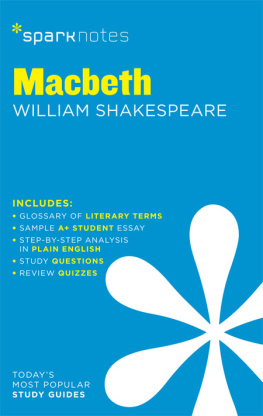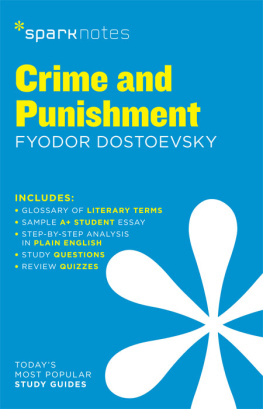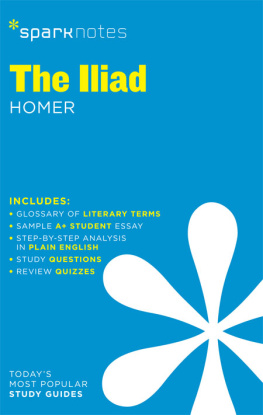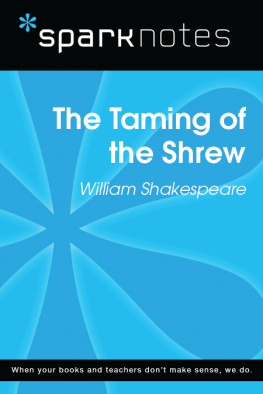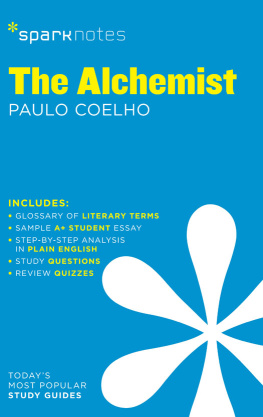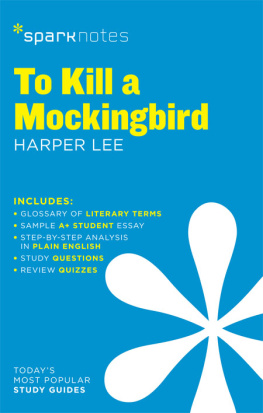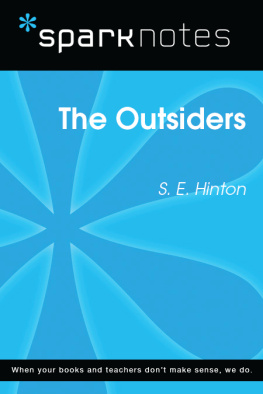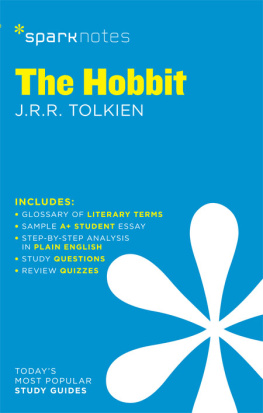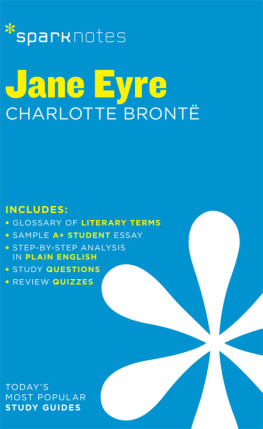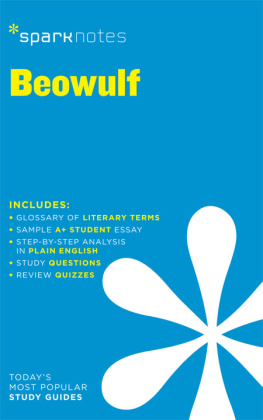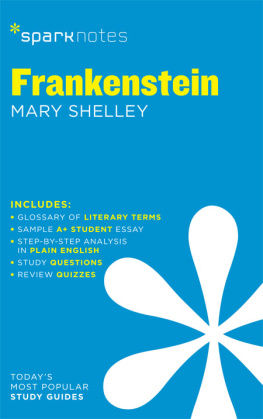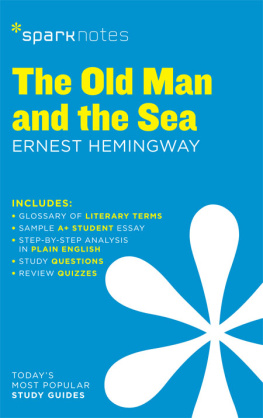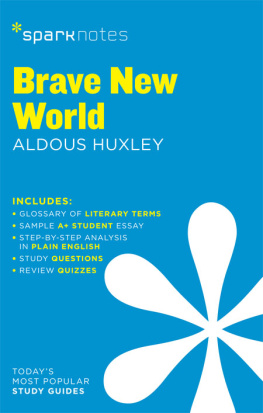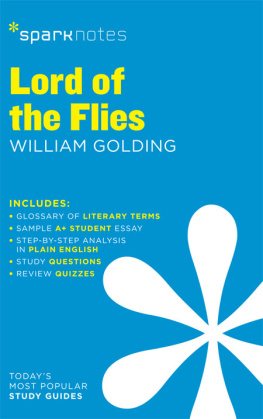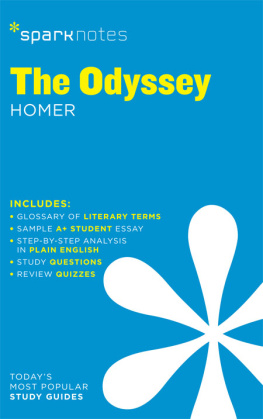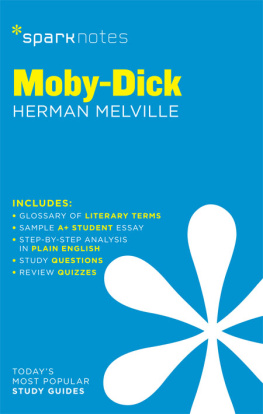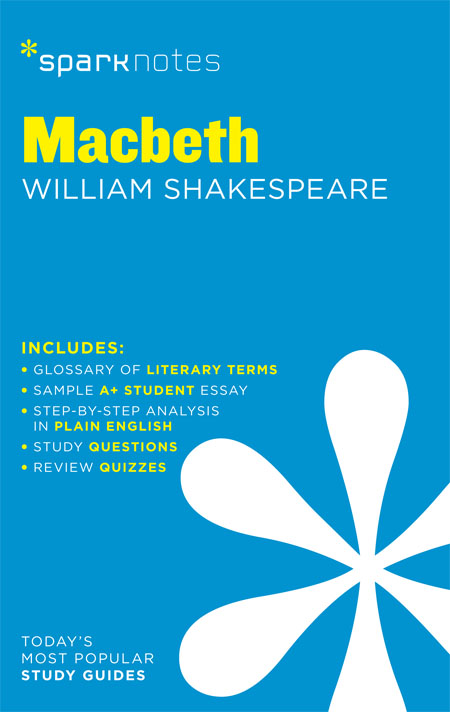Macbeth
William Shakespeare
2003, 2007 by Spark Publishing
This Spark Publishing edition 2014 by SparkNotes LLC, an Affiliate of Barnes & Noble
All rights reserved. No part of this publication may be reproduced, stored in a retrieval system, or transmitted in any form or by any means (including electronic, mechanical, photocopying, recording, or otherwise) without prior written permission from the publisher.
Sparknotes is a registered trademark of SparkNotes LLC
Spark Publishing
A Division of Barnes & Noble
120 Fifth Avenue
New York, NY 10011
www.sparknotes.com /
ISBN-13: 978-1-4114-7173-3
Please submit changes or report errors to www.sparknotes.com/errors.
10 9 8 7 6 5 4 3 2 1
Context
T he most influential writer in all of English literature, William Shakespeare was born in 1564 to a successful middle-class glove-maker in Stratford-upon-Avon, England. Shakespeare attended grammar school, but his formal education proceeded no further. In 1582 he married an older woman, Anne Hathaway, and had three children with her. Around 1590 he left his family behind and traveled to London to work as an actor and playwright. Public and critical acclaim quickly followed, and Shakespeare eventually became the most popular playwright in England and part-owner of the Globe Theater. His career bridged the reigns of Elizabeth I (ruled 1558 1603 ) and James I (ruled 1603 1625 ), and he was a favorite of both monarchs. Indeed, James granted Shakespeares company the greatest possible compliment by bestowing upon its members the title of Kings Men. Wealthy and renowned, Shakespeare retired to Stratford and died in 1616 at the age of fifty-two. At the time of Shakespeares death, literary luminaries such as Ben Jonson hailed his works as timeless.
Shakespeares works were collected and printed in various editions in the century following his death, and by the early eighteenth century his reputation as the greatest poet ever to write in English was well established. The unprecedented admiration garnered by his works led to a fierce curiosity about Shakespeares life, but the dearth of biographical information has left many details of Shakespeares personal history shrouded in mystery. Some people have concluded from this fact and from Shakespeares modest education that Shakespeares plays were actually written by someone elseFrancis Bacon and the Earl of Oxford are the two most popular candidatesbut the support for this claim is overwhelmingly circumstantial, and the theory is not taken seriously by many scholars.
In the absence of credible evidence to the contrary, Shakespeare must be viewed as the author of the thirty-seven plays and sonnets that bear his name. The legacy of this body of work is immense. A number of Shakespeares plays seem to have transcended even the category of brilliance, becoming so influential as to affect profoundly the course of Western literature and culture ever after.
Shakespeares shortest and bloodiest tragedy, Macbeth tells the story of a brave Scottish general (Macbeth) who receives a prophecy from a trio of sinister witches that one day he will become King of Scotland. Consumed with ambitious thoughts and spurred to action by his wife, Macbeth murders King Duncan and seizes the throne for himself. He begins his reign racked with guilt and fear and soon becomes a tyrannical ruler, as he is forced to commit more and more murders to protect himself from enmity and suspicion. The bloodbath swiftly propels Macbeth and Lady Macbeth to arrogance, madness, and death.
Macbeth was most likely written in 1606 , early in the reign of James I, who had been James VI of Scotland before he succeeded to the English throne in 1603 . James was a patron of Shakespeares acting company, and of all the plays Shakespeare wrote under Jamess reign, Macbeth most clearly reflects the playwrights close relationship with the sovereign. In focusing on Macbeth, a figure from Scottish history, Shakespeare paid homage to his kings Scottish lineage. Additionally, the witches prophecy that Banquo will found a line of kings is a clear nod to Jamess familys claim to have descended from the historical Banquo. In a larger sense, the theme of bad versus good kingship, embodied by Macbeth and Duncan, respectively, would have resonated at the royal court, where James was busy developing his English version of the theory of divine right.
Macbeth is not Shakespeares most complex play, but it is certainly one of his most powerful and emotionally intense. Whereas Shakespeares other major tragedies, such as Hamlet and Othello, fastidiously explore the intellectual predicaments faced by their subjects and the fine nuances of their subjects characters, Macbeth tumbles madly from its opening to its conclusion. It is a sharp, jagged sketch of theme and character; as such, it has shocked and fascinated audiences for nearly four hundred years.
Plot Overview
T he play begins with the brief appearance of a trio of witches and then moves to a military camp, where the Scottish King Duncan hears the news that his generals, Macbeth and Banquo, have defeated two separate invading armiesone from Ireland, led by the rebel Macdonald, and one from Norway. Following their pitched battle with these enemy forces, Macbeth and Banquo encounter the witches as they cross a moor. The witches prophesy that Macbeth will be made thane (a rank of Scottish nobility) of Cawdor and eventually King of Scotland. They also prophesy that Macbeths companion, Banquo, will beget a line of Scottish kings, although Banquo will never be king himself. The witches vanish, and Macbeth and Banquo treat their prophecies skeptically until some of King Duncans men come to thank the two generals for their victories in battle and to tell Macbeth that he has indeed been named thane of Cawdor. The previous thane betrayed Scotland by fighting for the Norwegians and Duncan has condemned him to death. Macbeth is intrigued by the possibility that the remainder of the witches prophecythat he will be crowned kingmight be true, but he is uncertain what to expect. He visits with King Duncan, and they plan to dine together at Inverness, Macbeths castle, that night. Macbeth writes ahead to his wife, Lady Macbeth, telling her all that has happened.
Lady Macbeth suffers none of her husbands uncertainty. She desires the kingship for him and wants him to murder Duncan in order to obtain it. When Macbeth arrives at Inverness, she overrides all of her husbands objections and persuades him to kill the king that very night. He and Lady Macbeth plan to get Duncans two chamberlains drunk so they will black out; the next morning they will blame the murder on the chamberlains, who will be defenseless, as they will remember nothing. While Duncan is asleep, Macbeth stabs him, despite his doubts and a number of supernatural portents, including a vision of a bloody dagger. When Duncans death is discovered the next morning, Macbeth kills the chamberlainsostensibly out of rage at their crimeand easily assumes the kingship. Duncans sons Malcolm and Donalbain flee to England and Ireland, respectively, fearing that whoever killed Duncan desires their demise as well.
Fearful of the witches prophecy that Banquos heirs will seize the throne, Macbeth hires a group of murderers to kill Banquo and his son Fleance. They ambush Banquo on his way to a royal feast, but they fail to kill Fleance, who escapes into the night. Macbeth becomes furious: as long as Fleance is alive, he fears that his power remains insecure. At the feast that night, Banquos ghost visits Macbeth. When he sees the ghost, Macbeth raves fearfully, startling his guests, who include most of the great Scottish nobility. Lady Macbeth tries to neutralize the damage, but Macbeths kingship incites increasing resistance from his nobles and subjects. Frightened, Macbeth goes to visit the witches in their cavern. There, they show him a sequence of demons and spirits who present him with further prophecies: he must beware of Macduff, a Scottish nobleman who opposed Macbeths accession to the throne; he is incapable of being harmed by any man born of woman; and he will be safe until Birnam Wood comes to Dunsinane Castle. Macbeth is relieved and feels secure, because he knows that all men are born of women and that forests cannot move. When he learns that Macduff has fled to England to join Malcolm, Macbeth orders that Macduffs castle be seized and, most cruelly, that Lady Macduff and her children be murdered.

